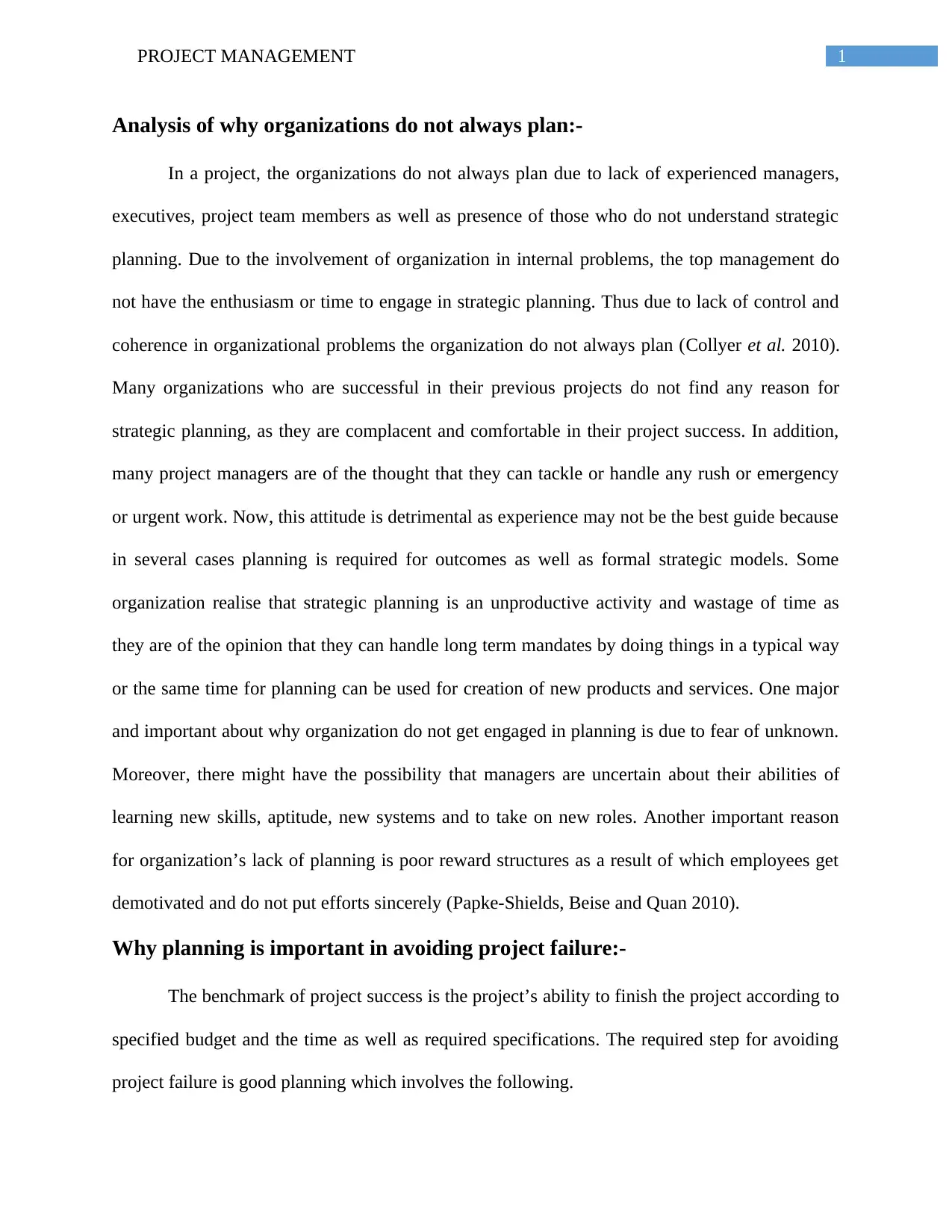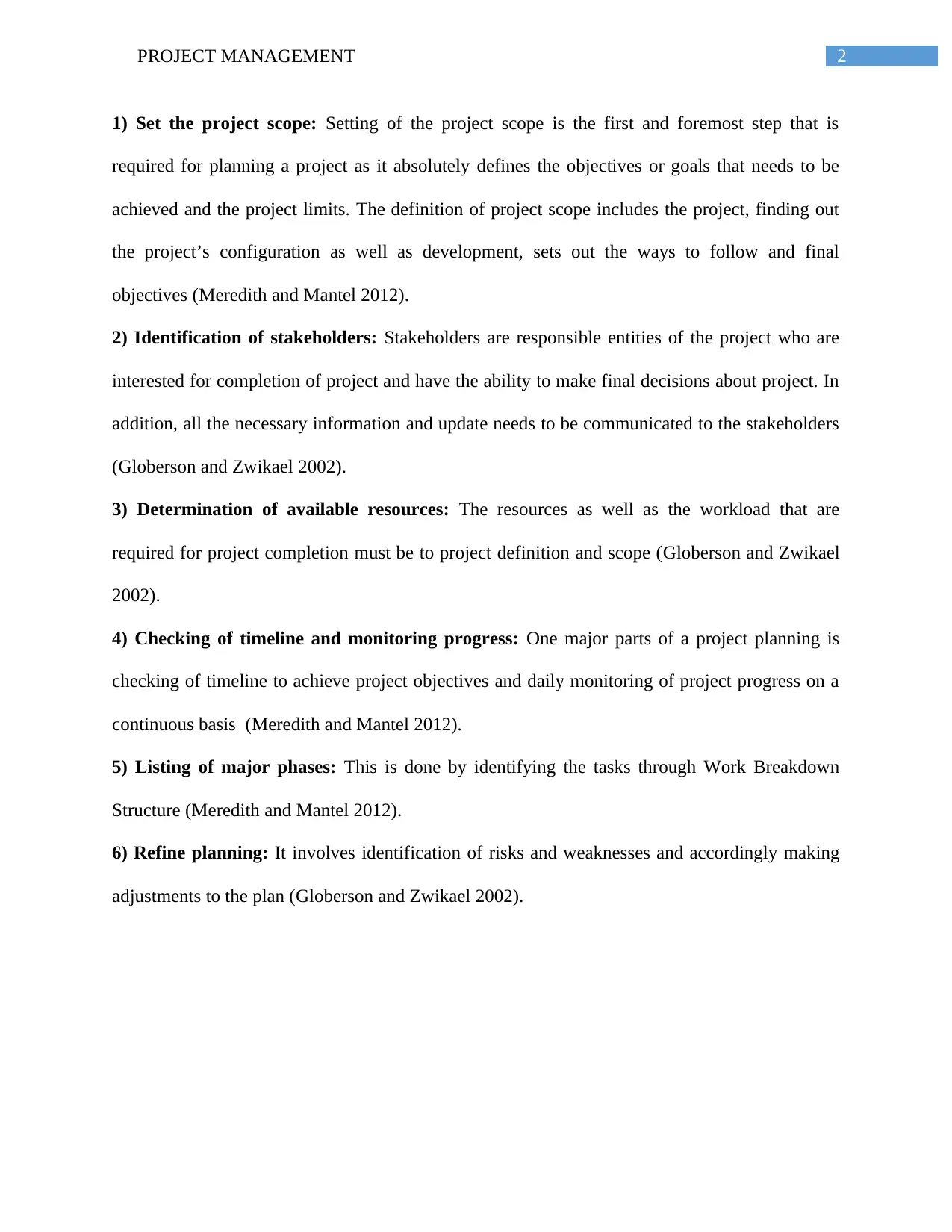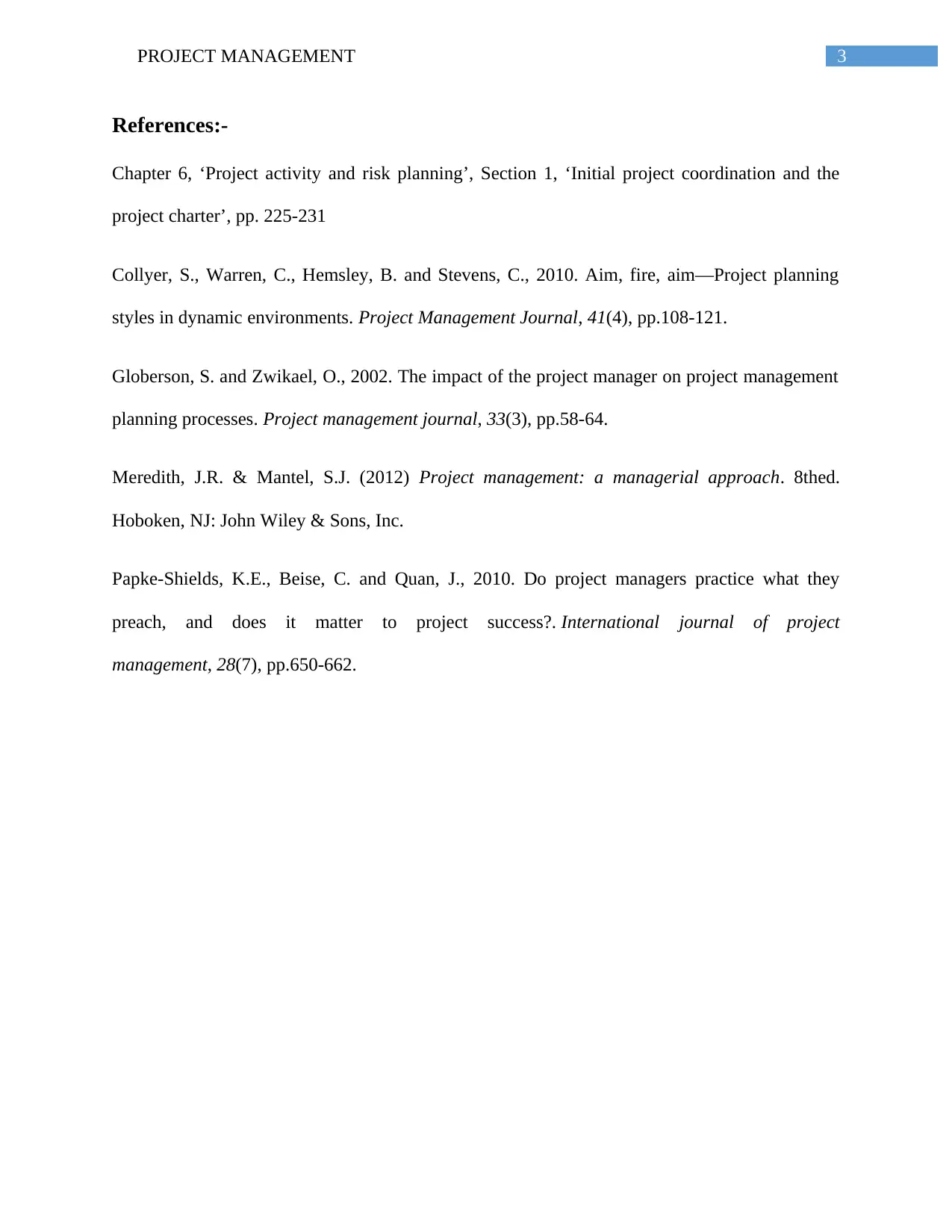Project Planning, Importance, and Avoiding Project Failure Analysis
VerifiedAdded on 2023/06/04
|4
|833
|352
Report
AI Summary
This report provides an analysis of why organizations often fail to plan projects effectively. It explores factors such as lack of experienced managers, internal organizational problems, complacency, and fear of the unknown. The report emphasizes the critical importance of project planning to avoid project failure, highlighting key steps such as setting project scope, identifying stakeholders, determining available resources, checking timelines, listing major phases, and refining the plan. The report references several sources and provides a comprehensive overview of project management planning and its impact on project success, as well as insights into the common pitfalls that organizations encounter during the planning phase.

Running head: PROJECT MANAGEMENT
Project Management
Name of the Student:
Name of the University:
Author Note:
Project Management
Name of the Student:
Name of the University:
Author Note:
Paraphrase This Document
Need a fresh take? Get an instant paraphrase of this document with our AI Paraphraser

PROJECT MANAGEMENT 1
Analysis of why organizations do not always plan:-
In a project, the organizations do not always plan due to lack of experienced managers,
executives, project team members as well as presence of those who do not understand strategic
planning. Due to the involvement of organization in internal problems, the top management do
not have the enthusiasm or time to engage in strategic planning. Thus due to lack of control and
coherence in organizational problems the organization do not always plan (Collyer et al. 2010).
Many organizations who are successful in their previous projects do not find any reason for
strategic planning, as they are complacent and comfortable in their project success. In addition,
many project managers are of the thought that they can tackle or handle any rush or emergency
or urgent work. Now, this attitude is detrimental as experience may not be the best guide because
in several cases planning is required for outcomes as well as formal strategic models. Some
organization realise that strategic planning is an unproductive activity and wastage of time as
they are of the opinion that they can handle long term mandates by doing things in a typical way
or the same time for planning can be used for creation of new products and services. One major
and important about why organization do not get engaged in planning is due to fear of unknown.
Moreover, there might have the possibility that managers are uncertain about their abilities of
learning new skills, aptitude, new systems and to take on new roles. Another important reason
for organization’s lack of planning is poor reward structures as a result of which employees get
demotivated and do not put efforts sincerely (Papke-Shields, Beise and Quan 2010).
Why planning is important in avoiding project failure:-
The benchmark of project success is the project’s ability to finish the project according to
specified budget and the time as well as required specifications. The required step for avoiding
project failure is good planning which involves the following.
Analysis of why organizations do not always plan:-
In a project, the organizations do not always plan due to lack of experienced managers,
executives, project team members as well as presence of those who do not understand strategic
planning. Due to the involvement of organization in internal problems, the top management do
not have the enthusiasm or time to engage in strategic planning. Thus due to lack of control and
coherence in organizational problems the organization do not always plan (Collyer et al. 2010).
Many organizations who are successful in their previous projects do not find any reason for
strategic planning, as they are complacent and comfortable in their project success. In addition,
many project managers are of the thought that they can tackle or handle any rush or emergency
or urgent work. Now, this attitude is detrimental as experience may not be the best guide because
in several cases planning is required for outcomes as well as formal strategic models. Some
organization realise that strategic planning is an unproductive activity and wastage of time as
they are of the opinion that they can handle long term mandates by doing things in a typical way
or the same time for planning can be used for creation of new products and services. One major
and important about why organization do not get engaged in planning is due to fear of unknown.
Moreover, there might have the possibility that managers are uncertain about their abilities of
learning new skills, aptitude, new systems and to take on new roles. Another important reason
for organization’s lack of planning is poor reward structures as a result of which employees get
demotivated and do not put efforts sincerely (Papke-Shields, Beise and Quan 2010).
Why planning is important in avoiding project failure:-
The benchmark of project success is the project’s ability to finish the project according to
specified budget and the time as well as required specifications. The required step for avoiding
project failure is good planning which involves the following.

PROJECT MANAGEMENT 2
1) Set the project scope: Setting of the project scope is the first and foremost step that is
required for planning a project as it absolutely defines the objectives or goals that needs to be
achieved and the project limits. The definition of project scope includes the project, finding out
the project’s configuration as well as development, sets out the ways to follow and final
objectives (Meredith and Mantel 2012).
2) Identification of stakeholders: Stakeholders are responsible entities of the project who are
interested for completion of project and have the ability to make final decisions about project. In
addition, all the necessary information and update needs to be communicated to the stakeholders
(Globerson and Zwikael 2002).
3) Determination of available resources: The resources as well as the workload that are
required for project completion must be to project definition and scope (Globerson and Zwikael
2002).
4) Checking of timeline and monitoring progress: One major parts of a project planning is
checking of timeline to achieve project objectives and daily monitoring of project progress on a
continuous basis (Meredith and Mantel 2012).
5) Listing of major phases: This is done by identifying the tasks through Work Breakdown
Structure (Meredith and Mantel 2012).
6) Refine planning: It involves identification of risks and weaknesses and accordingly making
adjustments to the plan (Globerson and Zwikael 2002).
1) Set the project scope: Setting of the project scope is the first and foremost step that is
required for planning a project as it absolutely defines the objectives or goals that needs to be
achieved and the project limits. The definition of project scope includes the project, finding out
the project’s configuration as well as development, sets out the ways to follow and final
objectives (Meredith and Mantel 2012).
2) Identification of stakeholders: Stakeholders are responsible entities of the project who are
interested for completion of project and have the ability to make final decisions about project. In
addition, all the necessary information and update needs to be communicated to the stakeholders
(Globerson and Zwikael 2002).
3) Determination of available resources: The resources as well as the workload that are
required for project completion must be to project definition and scope (Globerson and Zwikael
2002).
4) Checking of timeline and monitoring progress: One major parts of a project planning is
checking of timeline to achieve project objectives and daily monitoring of project progress on a
continuous basis (Meredith and Mantel 2012).
5) Listing of major phases: This is done by identifying the tasks through Work Breakdown
Structure (Meredith and Mantel 2012).
6) Refine planning: It involves identification of risks and weaknesses and accordingly making
adjustments to the plan (Globerson and Zwikael 2002).
⊘ This is a preview!⊘
Do you want full access?
Subscribe today to unlock all pages.

Trusted by 1+ million students worldwide

PROJECT MANAGEMENT 3
References:-
Chapter 6, ‘Project activity and risk planning’, Section 1, ‘Initial project coordination and the
project charter’, pp. 225-231
Collyer, S., Warren, C., Hemsley, B. and Stevens, C., 2010. Aim, fire, aim—Project planning
styles in dynamic environments. Project Management Journal, 41(4), pp.108-121.
Globerson, S. and Zwikael, O., 2002. The impact of the project manager on project management
planning processes. Project management journal, 33(3), pp.58-64.
Meredith, J.R. & Mantel, S.J. (2012) Project management: a managerial approach. 8thed.
Hoboken, NJ: John Wiley & Sons, Inc.
Papke-Shields, K.E., Beise, C. and Quan, J., 2010. Do project managers practice what they
preach, and does it matter to project success?. International journal of project
management, 28(7), pp.650-662.
References:-
Chapter 6, ‘Project activity and risk planning’, Section 1, ‘Initial project coordination and the
project charter’, pp. 225-231
Collyer, S., Warren, C., Hemsley, B. and Stevens, C., 2010. Aim, fire, aim—Project planning
styles in dynamic environments. Project Management Journal, 41(4), pp.108-121.
Globerson, S. and Zwikael, O., 2002. The impact of the project manager on project management
planning processes. Project management journal, 33(3), pp.58-64.
Meredith, J.R. & Mantel, S.J. (2012) Project management: a managerial approach. 8thed.
Hoboken, NJ: John Wiley & Sons, Inc.
Papke-Shields, K.E., Beise, C. and Quan, J., 2010. Do project managers practice what they
preach, and does it matter to project success?. International journal of project
management, 28(7), pp.650-662.
1 out of 4
Related Documents
Your All-in-One AI-Powered Toolkit for Academic Success.
+13062052269
info@desklib.com
Available 24*7 on WhatsApp / Email
![[object Object]](/_next/static/media/star-bottom.7253800d.svg)
Unlock your academic potential
Copyright © 2020–2026 A2Z Services. All Rights Reserved. Developed and managed by ZUCOL.





